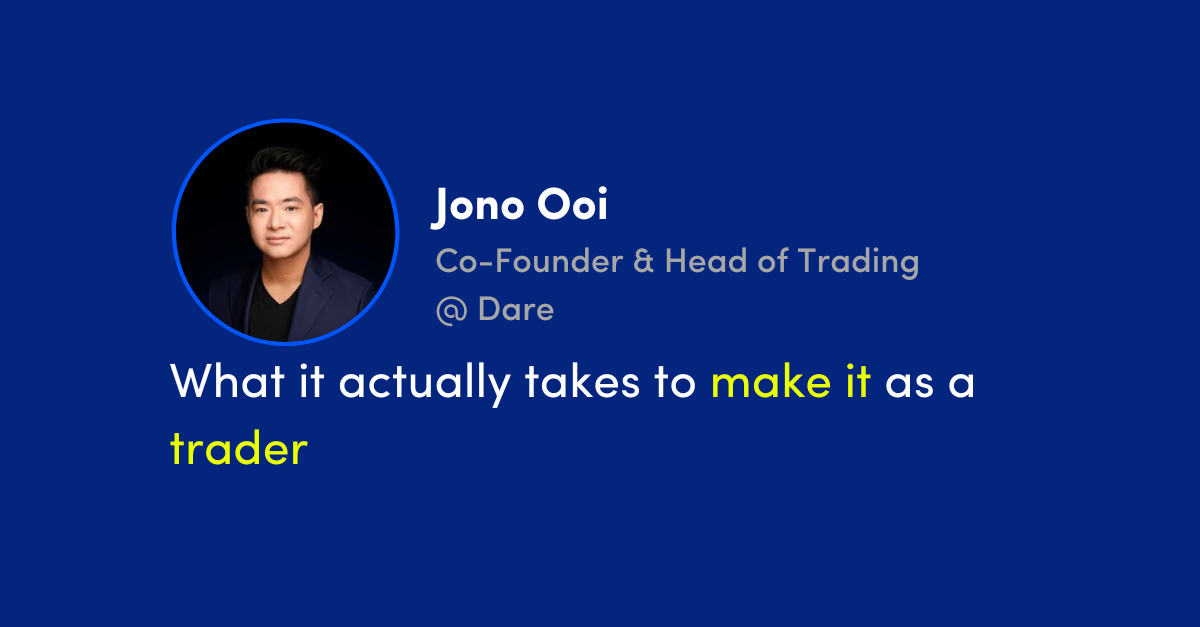
In this chapter, Jono runs through the ideas, concepts and mindsets that will help you get ahead in the world of trading before you even submit an application. Tune in and follow us for future entries that will cover the assessment process and early-day preparations for settling into your new role.
I’ve interviewed no fewer than 200 candidates for trading roles over the past year. These have all been final-stage interviews, for positions across the board. Our hopefuls come from a broad spectrum of backgrounds and have vastly different levels of experience.
Trading as a lifestyle has been glorified (and at times vilified) by films and social media FX (foreign exchange) “influencers” over the last few years. The truth is that anyone looking to seriously pursue a career in the sector isn’t doing what you see on TikTok. The reality is not even close.
This isn’t your typical script for interview questions or list of which university events to attend (the quick answer is all of them). Read on to hear the no-filter version of what it really takes to succeed in a trading role.
The early game - pre-applications
#1: What does a trader actually do?
An immediate distinction between interview candidates is those who have spent the time to understand what life is truly like as a trader and those who, generically, “want to work in a fast-paced environment”.
This requires some out-of-the-box thinking alongside some deeper research. Find articles, videos and podcasts on traders' lifestyles. Listen to them talk about their roles. Reach out to analysts on LinkedIn and find out what parts of the job you think you would actually enjoy. In a future post, I’ll be sharing more top tips to help you grow your trading skills and mindset so stay tuned for more details.
Life as a trading graduate at a global macro firm will also be vastly different to that at a proprietary trading firm. Showing an understanding of that will be a massive differentiator to other applicants.
#2: Trial by fire
Start up a demo account. Even better - if you have the means, start up a small trading account yourself and build your experience by test trading. Make small trades yourself. Anyone is able to trade on real markets.
Spend a few days doing this from morning to evening. Focus the entire day on a particular strategy you might want to run and learn from that experience. This will give you valuable talking points for future discussions and an insight into what it’s like to sit in front of multiple screens for 10 hours a day. This is what a trader does. If you find yourself bored after a couple of days of staring at numbers, then it’s probably not for you.
#3: Learn how to lose
There is no magic formula for trading – and if there is, no one’s giving it out. Don't spend your time on FX technical indicator Discord groups you found on Instagram - these are inaccurate and won't be of any real use to you. Pick up a hobby such as poker or a competitive video game where you will be losing for a guaranteed amount of time.
Learn how to be competitive whilst controlling the negative emotions that come from losing – this will give you a huge head start on everyone else. Every trader learns that there is no such thing as a perfect trade.
#4: Get comfortable with being uncomfortable
Trading is naturally going to feel unnatural when you start out. You’re going to be thrown into an aggressive, zero-sum environment full of terminology and language that will undoubtedly be foreign to you. Get used to discomfort now and learn how to adapt and thrive in situations that you normally wouldn’t experience.
If you’ve spent your entire university life in the library, then go out and touch the grass. Join socials where you don’t know anyone. Pick up a new sport. Building this skill will accelerate how quickly you adjust to any new situation, making the unfamiliar familiar.

